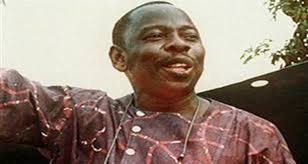P
ProfRem
Guest
Supporters of renowned Nigerian environmental activist Ken Saro-Wiwa have called for him to be posthumously pardoned, as they mark the 20th anniversary of his execution.
Nigeria's then-military regime sparked global outrage after convicting Mr Saro-Wiwa of murder and hanging him.

The West African state's main human rights body said his trial was "deeply flawed", and he should be pardoned.
Mr Saro-Wiwa led mass protests against oil pollution in Nigeria's Ogoniland.
The protests were seen as a major threat to then-military ruler Gen Sani Abacha, and oil giant Shell.
Military rule ended in Nigeria, Africa's most populous state and biggest oil producer, in 1999.
The head of the government-appointed Nigerian Human Rights Commission Chidi Odinkalu said there was no doubt Ken Saro-Wiwa's trial was "deeply flawed" and "unsafe".
A posthumous pardon was the only way to restore the integrity of the state which "breached its own laws to procure a killing", he added, the AFP news agency reports.
The head of the government-appointed Nigerian Human Rights Commission Chidi Odinkalu said there was no doubt Ken Saro-Wiwa's trial was "deeply flawed" and "unsafe".
A posthumous pardon was the only way to restore the integrity of the state which "breached its own laws to procure a killing", he added, the AFP news agency reports.
The main events to commemorate Mr Saro-Wiwa's death - including a "justice walk" - are taking place in the main oil city, Port Harcourt, reports the BBC's Chris Ewokor from the capital, Abuja.
Nigeria's port authorities have refused to release a metal bus, shipped from the UK, which was to have been part of the commemorations because they regarded its message as highly political, source adds.
It had written on it Mr Saro-Wiwa's famous phrase: "I accuse the oil companies of committing genocide."
Suzanne Dhaliwal from campaign group Action Soro-Wiwa condemned the seizure of the bus.
"We are still seeing the same attitudes to the freedom of expression that were there 20 years ago," she told the BBC's Newsday programme.
The bus is an artwork of UK-based Nigerian artist Sokari Douglas Camp, and was done about a decade ago.
It was commissioned by campaign groups, including Platform and Amnesty International, to show solidarity with Nigerians who are still affected by oil pollution.
Last week, Amnesty and the Centre for Environment, Human Rights and Development accused Shell of making false claims about the extent of its clean-up operations in Nigeria.
In a report, they said several sites Shell claimed to have had cleaned up were still polluted. Shell said that it disagreed with their findings.
Mr Saro-Wiwa and eight other activists were hanged after a secret trial which saw them being convicted of murdering four traditional leaders.
They denied the charge, and said they were framed.
The executions led to Nigeria's temporary suspension from the Commonwealth.
Source: BBC
Nigeria's then-military regime sparked global outrage after convicting Mr Saro-Wiwa of murder and hanging him.

The West African state's main human rights body said his trial was "deeply flawed", and he should be pardoned.
Mr Saro-Wiwa led mass protests against oil pollution in Nigeria's Ogoniland.
The protests were seen as a major threat to then-military ruler Gen Sani Abacha, and oil giant Shell.
Military rule ended in Nigeria, Africa's most populous state and biggest oil producer, in 1999.
The head of the government-appointed Nigerian Human Rights Commission Chidi Odinkalu said there was no doubt Ken Saro-Wiwa's trial was "deeply flawed" and "unsafe".
A posthumous pardon was the only way to restore the integrity of the state which "breached its own laws to procure a killing", he added, the AFP news agency reports.
The head of the government-appointed Nigerian Human Rights Commission Chidi Odinkalu said there was no doubt Ken Saro-Wiwa's trial was "deeply flawed" and "unsafe".
A posthumous pardon was the only way to restore the integrity of the state which "breached its own laws to procure a killing", he added, the AFP news agency reports.
The main events to commemorate Mr Saro-Wiwa's death - including a "justice walk" - are taking place in the main oil city, Port Harcourt, reports the BBC's Chris Ewokor from the capital, Abuja.
Nigeria's port authorities have refused to release a metal bus, shipped from the UK, which was to have been part of the commemorations because they regarded its message as highly political, source adds.
It had written on it Mr Saro-Wiwa's famous phrase: "I accuse the oil companies of committing genocide."
Suzanne Dhaliwal from campaign group Action Soro-Wiwa condemned the seizure of the bus.
"We are still seeing the same attitudes to the freedom of expression that were there 20 years ago," she told the BBC's Newsday programme.
The bus is an artwork of UK-based Nigerian artist Sokari Douglas Camp, and was done about a decade ago.
It was commissioned by campaign groups, including Platform and Amnesty International, to show solidarity with Nigerians who are still affected by oil pollution.
Last week, Amnesty and the Centre for Environment, Human Rights and Development accused Shell of making false claims about the extent of its clean-up operations in Nigeria.
In a report, they said several sites Shell claimed to have had cleaned up were still polluted. Shell said that it disagreed with their findings.
Mr Saro-Wiwa and eight other activists were hanged after a secret trial which saw them being convicted of murdering four traditional leaders.
They denied the charge, and said they were framed.
The executions led to Nigeria's temporary suspension from the Commonwealth.
Source: BBC

